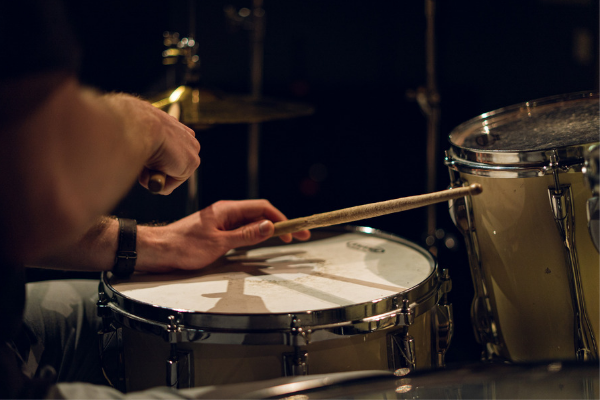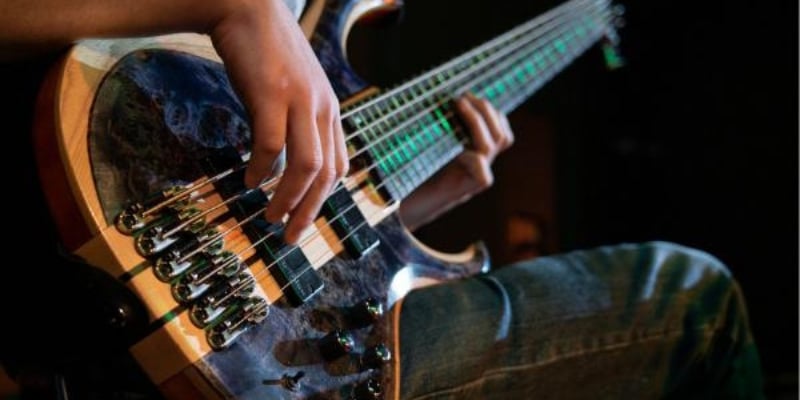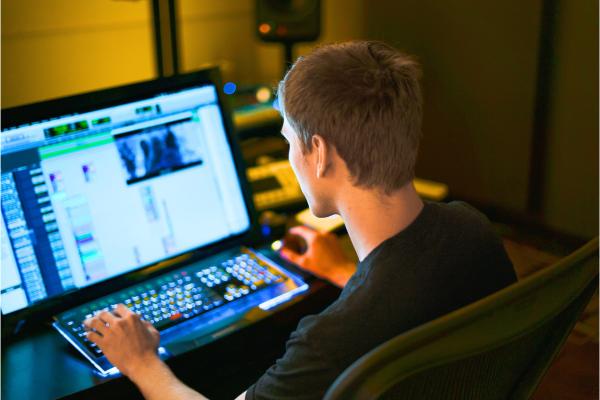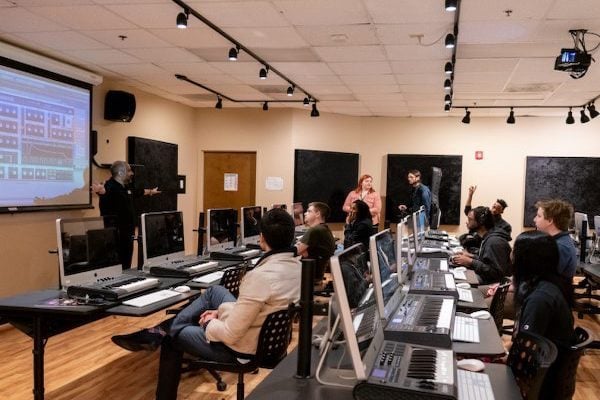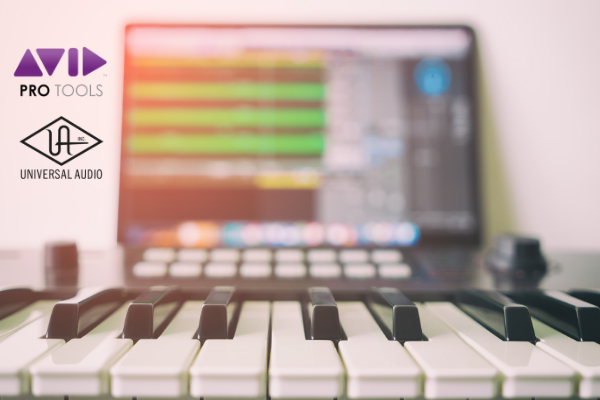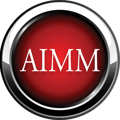Music and Technology Associate Degree: Guitar Concentration

Associate of Applied Science in Music and Technology: Guitar Concentration
This guitar degree, the Music and Technology Associate Degree: Guitar Concentration, offers the intermediate guitar student a fully immersive, nonstop music atmosphere.
It's designed to cater to those who are passionate about mastering the electric guitar and understanding the nuances of contemporary styles.
The Music and Technology Degree caters to the modern musician who, in order to thrive in today’s competitive music business and the music industry, wants to develop both their technical skill on an instrument and acquire an in-depth understanding of the writing, recording, mixing, and mastering process.
This degree in guitar ensures that students are well-prepared for a career as a touring musician or a guitar performer in various musical styles.
If you’re looking to push your musical and technical skills to the next level through specially designed guitar degree courses and a rigorous curriculum, then the Music and Technology Associate Degree: Guitar Concentration is perfect for you.
AIMM offers guitarists the best tips, techniques, and insider information that your favorite professional guitarists and famous musicians use.
The Music and Technology Associate Degree: Guitar Concentration delves deep into the world of electric guitar, ensuring students gain a comprehensive electric guitar degree that encompasses both the classical and contemporary aspects of guitar playing.
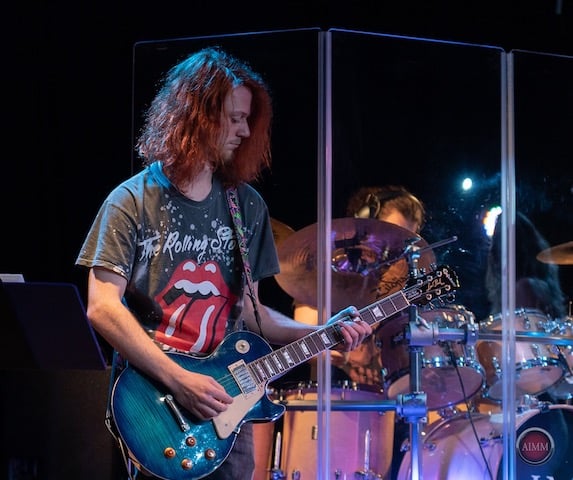
Top Guitar Degree Program And Career Development
You will not only graduate from AIMM with an Associate Degree in Music and Technology, but it is our goal that you will also have put together an impressive portfolio of your work and musical abilities.
You will not only graduate from AIMM with an Associate Degree in Music and Technology, but it is our goal that you will also have put together an impressive portfolio of your work and musical abilities.
This portfolio will be a testament to your expertise in guitar fundamentals and contemporary guitar skills, helping you find employment or self-employment in the competitive entertainment industry.
Your hands-on experience and diverse portfolio of skills will make you a prime candidate for not only record labels but also for:
- Video Games
- Movies
- Television
- Radio
- Multi-Media Production Studios
- And More!
With AIMM as your first step, your exciting music career opportunities will be endless. If you remain in good standing throughout the program, you will be eligible to take AVID Certification Exams to become Pro Tools Certified.
As an AVID Training Partner, AIMM offers you the opportunity to become AVID Pro Tools Certified as you progress through the curriculum. AIMM also focuses on Ableton Live, which bridges the divide between creative music production and live performance.
Using Pro Tools and Ableton Live, you will learn analog and digital music production, microphone techniques, virtual instruments, and effect plugins, as well as hone your education in music theory essentials and keyboard skills for the digital audio workstation.
Important note: The Music and Technology Degree is intended for intermediate musicians. Therefore, you must show proficiency on the instrument of your focus as detailed in the Admissions procedures.
Click here for our updated E-Brochure.
Guitar Student Success Timeline
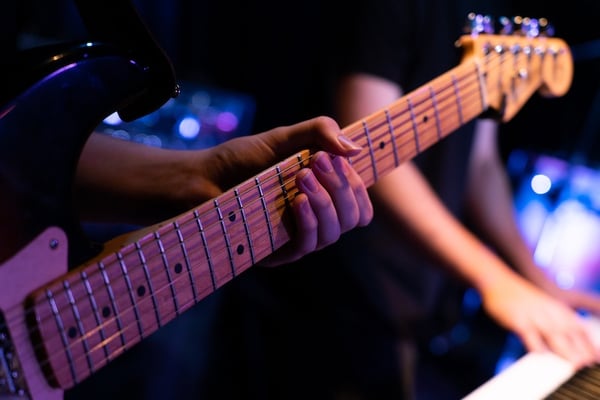
This program can be completed in 18 months of accelerated studies, 24 months of full-time enrollment, or 30 months of ¾ time enrollment. The opportunities and choices are there to make it easiest for you and your lifestyle.
Upon completion of this program, students in good standing will not only graduate with an Associate Degree but will also be given the opportunity to take AVID Certification Exams to become Pro Tools certified.
This Digital Audio Workstation (DAW) certification will set you apart from others and can be a great asset when searching for a job in your field.
Students in the guitar program are required to complete the requisite number of General Education Credits, and if students wish to transfer General Education credits completed at other institutions, they must demonstrate appropriate comparability to AIMM.
The opportunities are endless at AIMM, and your first step begins with applying. Click the link below to begin your journey confidently at the Atlanta Institute of Music and Media, an accredited institution with a comprehensive curriculum.
Career Opportunities with a Guitar Degree
Graduating with a guitar performance degree from AIMM doesn't just signify your proficiency with the instrument; it opens doors to a myriad of career opportunities in the music industry. Whether you're looking to become a touring musician, a studio session artist, or even a guitar teacher, this degree equips you with the skills and knowledge required.
Many of our graduates have gone on to become guitar performers in various musical styles, from classical to contemporary guitar music. Others have chosen the path of guitar masters, teaching the next generation of musicians and sharing their expertise in guitar fundamentals.
Furthermore, with the rise of digital media, there's a growing demand for skilled guitarists in the competitive entertainment industry. The opportunities are vast and varied, from providing soundtracks for video games and movies to performing live on television and radio shows.
For those with a penchant for academia, pursuing further studies like a degree in guitar performance or even a guitar performance bachelor at renowned schools of music can be a viable option. With a solid foundation from AIMM, you'll be well-prepared for advanced studies and specializations.
Why Choose AIMM for Your Guitar Degree?
At the Atlanta Institute of Music and Media, we pride ourselves on offering a comprehensive curriculum that's both rigorous and relevant. Our skilled faculty boasts extensive experience in the field, ensuring that students receive an unparalleled immersive experience.
Our acclaimed alumni list includes incredible graduates who have made their mark in the music industry. From famous musicians to industry professionals, our alumni network is a testament to the quality of education we provide.
Moreover, AIMM is not just an academic institution; it's a community. With industry mentors guiding you every step of the way and opportunities to collaborate with fellow students, you'll gain invaluable hands-on experience.
Lastly, we understand that pursuing higher education is a significant investment. That's why we ensure affordable tuition rates without compromising on the quality of education. With AIMM, you're not just earning a degree; you're setting the stage for a successful career in music.
Program Features
- Courses 39
- Credit Hours 94 hours
- Skill level Intermediate
- Language English
- Currently Enrolling Yes
Associate of Applied Science in Music and Technology
With a Concentration in Guitar
Core Courses — Students Must Complete 54 Credits
| Course Number | Course Title | Credits |
| INT100* | Performance I This course is an interdisciplinary live performance class based on standard introductory level repertoire for R'n'B, Blues, Rock and Pop styles. Students perform on stage weekly in a live interactive ensemble format with voice and rhythm section instrumentation that emulates professional gigging scenarios. The emphasis is on execution of melody, rhythm, chords, form, and improvisation. Materials such as sheet music, charts, play along tracks, lyrics, video tutorials are provided via Canvas Learning Management System. |
4 |
| INT200* | Performance II This course is an interdisciplinary live performance class based on standard intermediate level repertoire for R'n'B, Blues, Rock and Pop styles. Students perform on stage weekly in a live interactive ensemble format with voice and rhythm section instrumentation that emulates professional gigging scenarios. The emphasis is on execution of melody, rhythm, chords, form, and improvisation. Materials such as sheet music, charts, play along tracks, lyrics, video tutorials are provided via Canvas Learning Management System. Prerequisite : INT100 Performance I |
4 |
| INT300 | Performance III This course is an interdisciplinary live performance class based on standard intermediate-advanced level repertoire for R'n'B, Blues, Rock and Pop styles. Students perform on stage weekly in a live interactive ensemble format with voice and rhythm section instrumentation that emulates professional gigging scenarios. The emphasis is on execution of melody, rhythm, chords, form, and improvisation. Materials such as sheet music, charts, play along tracks, lyrics, video tutorials are provided via Canvas Learning Management System. Prerequisite : INT200 Performance II |
4 |
| INT400 | Performance IV This course is an interdisciplinary performance class based on standard advanced level repertoire for R'n'B, Blues, Rock and Pop styles. Students perform on stage weekly in a live interactive ensemble format with voice and rhythm section instrumentation that emulates professional gigging scenarios. The emphasis is on execution of melody, rhythm, chords, form, and improvisation. Materials such as sheet music, charts, play along tracks, lyrics, video tutorials are provided via Canvas Learning Management System. Prerequisite : INT300 Performance III |
4 |
| INT301 | Studio Performance This course is an interdisciplinary studio performance class based on standard intermediate-advanced level repertoire for R'n'B, Blues, Rock and Pop styles. Students perform in the recording studio weekly in an interactive ensemble format with voice and rhythm section instrumentation that emulates professional recording sessions. The emphasis is on execution of melody, rhythm, chords, form, and improvisation. Materials such as sheet music, charts, play along tracks, lyrics, video tutorials are provided via Canvas Learning Management System. Prerequisite : INT200 Performance II |
4 |
| INT145* | Music Theory Essentials I This class covers the basic elements of music theory, ear training and notation. Diatonic harmony, major and minor key signatures, triads and 7th chords, scale harmonization, meters, basic rhythmic notation, and chord symbol conventions. Students will practice recognizing fundamental musical elements by ear. Basic keyboard skills will be covered including chords, scales and reading. |
3 |
| INT245* | Music Theory Essentials II This class focuses on scales, modes and linear structures needed for improvisation and melody. Ear training and dictation of melody and diatonic chord progressions are covered. Advanced notation concepts including form, articulation and syncopated rhythm are included. Harmonic concepts are practiced and reinforced using a keyboard. Prerequisite : INT145 Music Theory Essentials I |
3 |
| GTR130 | Reading I * This course is designed to introduce and develop the skills required for sight reading of chords and single note melodies on the guitar. Beginning in the open position, students will read etudes, duets, and chord charts for each class session. By the end of the quarter, the student should be able to read up to the second position in a variety of styles and rhythmic patterns. |
1 |
| GTR230 | Reading II * This course is designed to develop the student’s ability to read in various positions on the neck. Beginning with the second and third positions, students will read etudes, duets, and chord charts for each class session. By the end of the quarter, students will be required to read single note melodies up to the seventh position and a variety of styles of chord charts. Prerequisite : GTR130 Reading I |
1 |
| GTR330 | Reading III Building on the techniques learned in previous reading classes, this course is designed to further develop the student’s ability to read different rhythmic groups in all positions of the neck. Along with introducing real world situations (including jazz band charts and transcribed solos), students will focus on developing the ability to read in a variety of formats with little or no preparation time. Prerequisite : GTR230 Reading II |
1 |
| GTR430 | Reading IV Students in Reading IV will be exposed to real world sight reading situations. Along with studying syncopated rhythms, the course introduces a variety of chart styles including big band charts, studio session charts, guitar ensemble charts, and fake book style charts. Prerequisite : GTR330 Reading III |
1 |
| GTR120 | Scales I Application of scales and arpeggios, taught within the context of the corresponding Performance class selections, with a focus on playing the changes with major and minor dominant blues. Topics covered: major scales with corresponding diatonic chords and arpeggios, major pentatonic, major pentatonic with flat 3, blues scale, natural minor, mixolydian mode. |
1 |
| GTR220 | Scales II Scales II explores the melodic minor scale in depth including: modes, arpeggios, and sequences. The class also explores uses of symmetric scales. Students are expected to play regularly, demonstrating not only knowledge of the scales, but also knowledge of how to use those scales to create music. Prerequisite : GTR120 Scales I |
1 |
| GTR320 | Scales III Annotated example solos are used to demonstrate the application of scales and arpeggios, which are taught within the context of corresponding performance class selections with a focus on jazz standards. Topics covered include: harmonic minor scales, diatonic harmonization with chords, arpeggios and modes, modes of melodic minor, the four superimpositions of melodic minor over dominant chords. Prerequisite : GTR220 Scales II |
1 |
| GTR420 | Scales IV Annotated example solos are used to demonstrate the application of scales and arpeggios, which are taught within the context of corresponding Performance class selections. Students will analyze the styles of various guitarists, including Django Reinhardt, Joe Pass, Pat Martino, Steve Morse, Mike Stern and Pat Metheny. Prerequisite : GTR320 Scales III |
1 |
| RCD100* | Pro Tools 101 This course introduces basic principles a student needs to understand how to complete a ProTools project, from initial setup to final delivery. Topics include purposes and uses of edit tools, modes, various track and signal clip functions for recording, editing, and importing audio, MIDI, and video used for music and media production. Included with the course textbook are media files for Pro Tools 101 exercises and hands-on projects. |
2 |
| RCD101* | Critical Listening Skills | 1 |
| RCD130* | MIDI: Synthesis and Sequencing This course is an introduction to the MIDI language, using Ableton Live and Native Instrument’s Komplete Bundle as the vessel of instruction. This course demonstrates core concepts such as the basic MIDI environment, sequencing, sampled-based and synthesis instruments, automation, and final steps for MIDI-based production including mixing and effects processing. |
4 |
| RCD140* | Introduction to Audio Production I This course gives the student an introduction to, and a strong foundation in, audio production techniques, including an introduction to analog recording history, physical properties of sound, basic microphone types, recording environments, mono and stereo microphone techniques as well as basic analog signal flow and analog signal processing including equalization and dynamic processing techniques. |
3 |
| RCD150* | Skills Lab | 1 |
| RCD200* | Pro Tools 110 This course builds on the introductory Pro Tools 101 course, evolving basic Pro Tools principles while providing the student with the essential processes needed to complete a Pro Tools project, from initial set up to final mixdown, and to take the Avid Pro Tools 110 Specialist Certification exam. The course teaches intermediate Pro Tools techniques, covering key concepts and skills needed to operate a Pro Tools system. Topics include Hardware I/O setup and routing, Elastic Audio, internal Bus path usages for send/returns, automation, and more. Included with the course textbook are media files for Pro Tools 110 exercises and hands-on projects. Students in good standing will have the opportunity to take the Avid Pro Tools 110 Specialist Certification exam upon course completion. Prerequisite : RCD100 Pro Tools 101 |
2 |
| RCD240* | Introduction to Audio Production II This course gives the student a more advanced introduction and foundation to audio production techniques including principles of analog & digital audio production and recording and data storage and playback media for digital audio formats. The student will gain an advanced understanding of large format analog console signal flow, time-based processors and an introduction to plug-in processing. Prerequisite : RCD140 Introduction to Audio Production I |
3 |
| RCD430* | Music Business | 1 |
| RCD530* | Portfolio for Web Media | 3 |
| Total | 54 | |
Elective Courses — Students Choose 16 Out of 43 Credits
| Course Number | Course Title | Credits |
| GTR910 | Group Lesson I (elective instrument) Students receive two hours of group instruction weekly to address areas of technique or theory for which they require assistance. |
2 |
| GTR920 | Group Lesson II (elective instrument) Students receive two hours of group instruction weekly to address areas of technique or theory for which they require assistance. Prerequisite : GTR910 Group Lesson I |
2 |
| GTR930 | Group Lesson III (elective instrument) Students receive two hours of group instruction weekly to address areas of technique or theory for which they require assistance. Prerequisite : GTR920 Group Lesson II |
2 |
| GTR940 | Group Lesson IV (elective instrument) Students receive two hours of group instruction weekly to address areas of technique or theory for which they require assistance. Prerequisite : GTR930 Group Lesson III |
2 |
| INT345 | Music Theory Essentials III This course focuses on the chord progressions and harmonic techniques used in contemporary music. Concepts include diatonic, extended diatonic and chromatic progressions, modulations and reharmonization. The keyboard is used to illustrate and reinforce these concepts. Students explore melodic, rhythmic and harmonic transcription, and basic desktop music publishing is covered. Prerequisite : INT245 Music Theory Essentials II |
3 |
| INT445 | Music Theory Essentials IV This course explores advanced harmonic and melodic techniques used in modern music. Melodic writing, harmonization, voice-leading and arranging are covered. Students will compose and arrange music using the techniques discussed, and will apply these ideas on the keyboard. Prerequisite : INT345 Music Theory Essentials III |
3 |
| RCD205* | Studio Interconnect Basics This course teaches the basics of studio connections and routing of electronics, various types of analog and digital cables and connections, and soldering basics, developing necessary skills commonly needed in professional and home studio environments. |
2 |
| RCD220* | Studio Acoustic Basics | 1 |
| RCD300 | Pro Tools HD 201 This course covers core concepts and skills needed to operate an Avid Pro Tools HD/Ultimate system in a professional studio environment, Included with the course textbook are media files for Pro Tools 201 exercises and hands-on projects. Prerequisite : RCD200 Pro Tools 110 |
2 |
| RCD320 | Electronic Music Production In this course, students will gain a broad understanding of the tools, production techniques and processes needed to successfully produce music and audio in the contemporary market. Techniques covered include working with and warping audio content in Ableton Live, use of various types of synthesized and drum machine sounds, MIDI and audio effect processors including arpeggiators, filters, saturation, sidechain compression, and more, while utilizing Ableton Live’s Racks and unique Session view for a digitally-based live performance setup and presentation. Prerequisite : RCD130 MIDI: Synthesis and Sequencing |
4 |
| RCD340 | Introduction to Music Production This course offers hands-on experience of the complete process for a professional music production inside AIMM studios, from beginning to end. The course moves the student through all stages of a music production from planning, to tracking demos, cutting basics, overdubs, vocal production, mixing and mastering. In each phase, students will learn a professional approach along with cutting edge techniques to utilize. In class, students will work with musicians and artists, and cover various roles utilized. Prerequisite : RCD240 Introduction to Audio Production II |
4 |
| RCD350 | Introduction to Live Sound | 2 |
| RCD400 | Pro Tools HD 210M This course covers specific techniques for working with advanced professional Avid Pro Tools systems in a music production environment. The main topics in this course are followed by exercises that allow the student to practice concepts taught in class. Included with the course textbook are media files for Pro Tools 210M exercises and hands-on projects. Students in good standing will have the opportunity to take the Avid Pro Tools 210M Professional Certification exam upon course completion. Prerequisite : RCD300 Pro Tools 201 |
2 |
| RCD410 | Science and Art of Mastering This course provides an overview of concepts, techniques, equipment and environments used in the process of mastering a record. Topics include outlining the differences between a mixing engineer and mastering engineer, use standard mastering tools and approaches with digital software, and types of delivery standards required for various platforms and release formats, including digital streaming to vinyl records. Prerequisite : RCD100 Pro Tools 101 |
1 |
| RCD435 | Methods of Mixing In this course students will explore both creative and technical aspects of audio mixing necessary to mix in the modern music environment. This course introduces the steps of the mixing process including organization, tempo mapping, editing, equalization, compression, dynamic processing, time-based effects, automation, specialty effects, and printing final mixes. The techniques and concepts presented apply to any digital or analog mixing scenario. Prerequisite : RCD200 Pro Tools 110 |
5 |
| RCD550 | Media Composer Fundamentals I In this course students will use the Media Composer 101: Media Composer Fundamental I coursework that covers specific topics for working with Media Composer in a professional video production environment. Prerequisite : RCD200 Pro Tools 110 |
2 |
| RCD560 | Media Composer Fundamentals II In this course students will use the Media Composer 110: Media Composer Fundamental II coursework that covers specific topics for working with Media Composer in a professional video production environment. Video Production II is for students and video editors who already have beginning knowledge of editing in Media Composer, and are ready to broaden their foundational skills and knowledge. Prerequisite : RCD550 Media Composer Fundamentals I |
2 |
| Total |
41 |
|
| Elective Credits Required | 16 | |
Required General Education Courses — Students Must Complete 24 Credits
| Course Number | Course Title | Credits |
| HUM110 | Creative Writing This course covers different kinds of writing across multiple genres, including—but not limited to—poetry, fiction, nonfiction and hybrid forms. Students will be encouraged to experiment with these forms of writing, to step out of their comfort zone and challenge their own preconceptions of where writing can take them. The great Russian writer Anton Chekhov once said, “don’t tell me the moon is shining; show me the glint of light on broken glass.” In essence, Chekhov is illustrating one of the most important principles of creative writing: the act of describing through imagery rather than simply “telling.” This course will take Chekhov’s dictum to heart by practicing reading and writing in each genre with an eye towards drafting, writing, and revising original compositions. |
3 |
| HUM115 | English Composition This class introduces students to the fundamentals of writing. Students will study standard English grammatical and syntactical conventions to ground our composition skills in the systems and structures that will make our writing legible to a general audience of standard English readers. Students also practice brainstorming, drafting, and revising in order to learn about the writing process, identify what works for us individually, and work towards making our processes more productive. Students will regularly apply what we have learned to different formal and informal genres to understand the transferability of standard English writing conventions and the praxis of writing texts across varying styles, forms, and purposes. |
3 |
| HUM120 | Music Appreciation This course is designed to expose students to a broad spectrum of musical ideas, concepts, and genres. Emphasis is placed on studying those musical concepts that hold true for all styles of music (form and structure, counterpoint, melodic and harmonic content). Genres covered include: Middle Ages; Renaissance; Baroque; Classical; Romantic; 20th Century; Jazz; Rock. |
3 |
| MAT110 | Accounting This course teaches the fundamental accounting and tax information needed to create a successful sound career in the music industry and digital media industries. It will include basic accounting and tax elements, information on setting up a business, selecting the appropriate type of business entity, and accounting aspects as related to various music and intellectual property transactions. |
3 |
| MAT120 | Mathematical Modeling This course covers applied algebra, linear, piecewise, exponential and quadratic functions. It focuses on logical problem-solving techniques required for critical thinking. Statistical analysis and probability will be used to analyze and explore real world data. In addition, students will develop a clear understanding of the role and function of quantitative analysis. This unit also focuses on skills needed to ensure students acquire better decision-making processes for money management in their personal and business lives. |
3 |
| SCI110 | Principles of Electronics |
3 |
| SCI120 | Physics of Sound This course introduces students to the physical nature of music and sound. Waves, sound propagation, harmonic content, the human hearing mechanism and musical instrument tone production are discussed. Psychoacoustics and perception of sound are included. |
3 |
| SOC110 | Cultural Anthropology Anthropologists take a broad approach to study and understand different aspects of the human experience. This course explores how people in different places live, use music, and interact with the world around them. Students will analyze select case studies from around the world. They will study the perspectives, practices, and social organization of other groups whose values and lifeways may be very different from their own.The knowledge they gain will enrich human understanding on a broader level. Special importance will be placed on global music styles that impact contemporary music including Indian classical music, West African Music, Brazilian Samba, Cuban music styles, and African-American folk music. |
3 |
| Total | 24 | |
| Program Total | 94 | |
Courses denoted with an asterisk (*) may be available to take online asynchronously. Please check with your Academic Advisor on availability.


